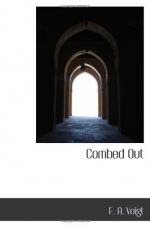When we got back to the theatre all the three teams were busy again.
The bearers came in with a case, and one of them said:
“This is the last Englishman, sir. There’s about half a dozen Fritzes to do, sir.”
“Bring ’em along—let’s get the job done.”
The swing-doors were pushed open and two bearers appeared with a stretcher on which a man clothed in grey was lying. His dark hair was matted. His boyish face was intensely white. His eyes were closed. He gave a hardly audible moan with every breath. A blanket was drawn up to his chin.
“Is this a Hun or a gentleman?” asked Captain Calthrop.
“A ’Un, sir,” said one of the bearers and grinned.
“Dump him on the table!”
The blanket was removed and a blood-sodden strip of linen unwound from the German boy’s right forearm, which was hanging to his shoulder by a few shreds of flesh and sinew.
“Tell him his arm’s got to come off.”
I explained to the boy that it would be necessary to remove his arm in order to save his life.
He did not seem to understand at first and looked at me with a puzzled expression. Then he suddenly broke into a wail, like a little child, and cried, “Ach Jesus, ach Jesus, ach Jesus ...”
The chloroform mask soon muffled his cries and he became unconscious. I grasped his cold hand and slender wrist. The arm was rapidly amputated. The red stump with the disc of severed bone in the middle was cleaned and bandaged and he was carried back to the prisoners’ ward, retching and vomiting.
On Captain Wheeler’s table lay a healthy looking German with a bronzed face. His legs were pitted with a great number of small wounds caused by minute bomb fragments. The mask was clapped over his mouth and the chloroform allowed to drip on to it. But he inhaled the fumes with difficulty, and began to choke.
The anaesthetist got angry and snarled:
“That’s it, choke away—a choker like all the rest of them—you blasted race of murderers—I’m sorry for the individual though, this deluded fool, for instance.”
Captain Dowden was vainly trying to converse with a German who had been hit in the back. The bullet had passed through the lower part of his lung, and then through the abdomen, leaving a hole through which part of the intestine projected.
“Come along and ask him some questions,” he said to me. “Don’t stand about there doing nothing—make yourself useful. Tell him he’ll be well treated—better than the English wounded are treated in Germany.”
The prisoner answered in a drawling whisper:
“I never expected bad treatment—the English wounded are not treated badly by us either.”
“Aren’t they! That’s all he knows about it!... Ask him if he likes war.”
“O God, no—war’s good for the rich, not for the poor.”
“I thought these Huns loved warfare—ask him if he thinks Germany will win.”




